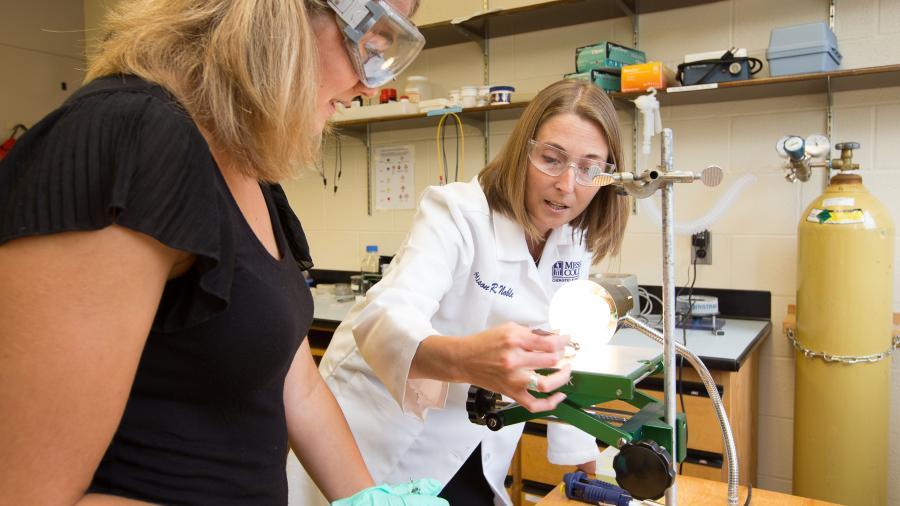Westmont Magazine A Cultured Chemist

Alison Noble ’97 never intended to follow her brother, Chris Noble ’94, to Westmont. But when she learned about opportunities to conduct chemistry research with professors, she got excited. “I realized Westmont would be a good fit for me,” she says. She spent a summer working in the lab with Professor
Niva Tro and sang with the college choir until chemistry labs conflicted with practice. She values the broad range of classes she took: art, history and religious studies. She even participated in Europe Semester with Rick and Barb Pointer.
“Studying abroad was a real gift and gave me a love for culture,” she says. “In graduate school, those of us who went to schools like Westmont were set apart. We think well—and outside the box—and write well and engage with people with different interests and backgrounds. We’ve developed interpersonal strengths and an element of cultural competence—and we were well prepared for the chemistry curriculum.”
After graduating from Westmont, Alison went straight into a doctoral program in chemistry at the University of Illinois, completing her degree in 2002. She met her husband, Niklas Hellgren, in a lab there. A postdoctoral fellow in physics from Sweden, he decided to stay in the United States with Alison rather than return home. Their two teenage children both speak Swedish—as does Alison—and they travel regularly to visit his family in Sweden.
Alison and Niklas worked at Intel Corporation in Oregon after graduate school, she as a senior process engineer developing next-generation microprocessors. She left after a few years to serve as a visiting professor at a nearby university. “I missed chemistry and teaching,” Alison says. “I also missed the service-oriented and interpersonal nature of the academic world. I missed building relationships and decided that developing people interested me more than developing microprocessors.”
The couple joined the faculty at Messiah University in Mechanicsburg, Pennsylvania, in 2010. “We never expected to move to central Pennsylvania,” says Alison, who grew up in Silicon Valley. “We gave up industry jobs for an academic paycheck because we felt a calling.”
Alison taught chemistry at Messiah and won a teaching award in 2017. In 2014, she was elected chair of the faculty and spent three years in leadership actively involved in issues such as implementing a new tenure policy.
“It is a privilege to work with faculty,” she says. She joined the provost’s staff full time as an assistant provost in 2018 and now serves as associate provost with responsibilities for the curriculum, faculty development, academic advising and general education. She misses teaching and making connections with students and remains open about returning to the classroom.
“I enjoy solving problems and working with people,” Alison says. “Listening to and understanding people and their different perspectives helps me bring them together. We need to listen well to each other.”
Messiah offers a range of online programs for graduate students and adult learners, as well as a selection of online courses for undergraduate or dual-enrolled students. Alison has taught general chemistry online, and now oversees educational technology. “Online classes benefit people worldwide who need and want education but can’t get it the traditional way,” she says. “As a Christian college, we provide a service to society by reaching a broad range of people, and it’s wonderful to leverage technology for that purpose.”
Most of the faculty had never taught online before the pandemic forced classes to move to Zoom. Last summer, Alison worked closely with an instructional design team and the director of faculty development to create a Canvas site for faculty where they could use a template for online courses and share ideas. “Some of our faculty and employees found ways to connect outside of their discipline and help each other,” she says.
Alison became familiar with the Lilly Foundation when she served as Messiah’s representative to their network of schools. The foundation nurtures students interested in working in church-related higher education and seeks to strengthen these institutions. She was elected to a four-year term on the National Board of the Lilly Fellows Program in 2020, which offers postdoctoral teaching fellowships and supports young adults exploring vocations at church-related colleges and universities.
Founded by members of the Brethren in Christ Church, Messiah maintains its pietistic and Anabaptist tradition. “I value the thoughtful, gentle, hospitable approach that emphasizes reconciliation,” Alison says. “My religious studies courses at Westmont framed the breadth of Christianity worldwide and continue to help me approach different traditions with interest, curiosity, humility and a willingness to learn.”
